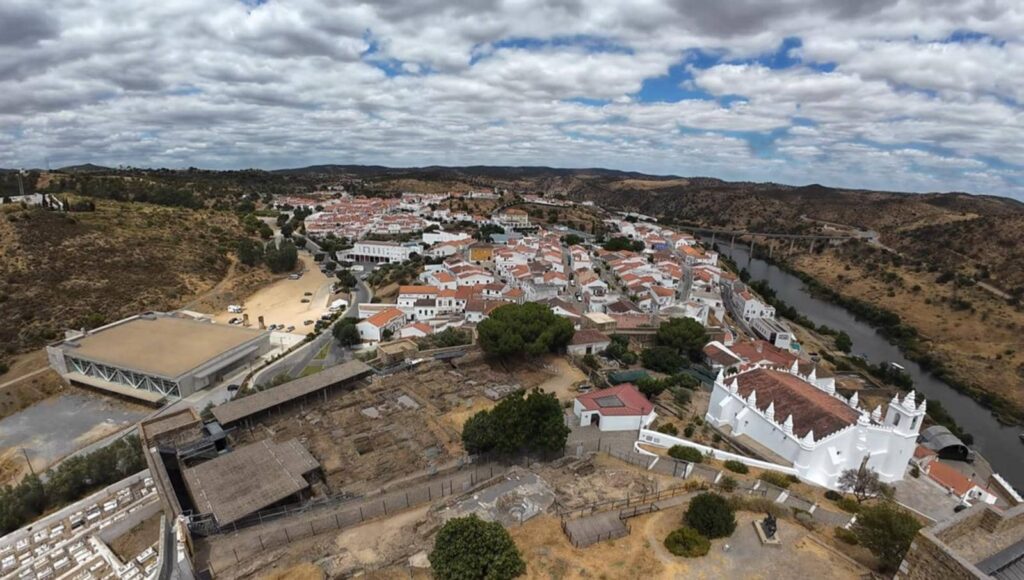Mértola is a picturesque village steeped in history and natural beauty. Located in the Beja District of the Alentejo region, Mértola is often called a “museum village” because of its rich layers of Roman, Moorish, and Christian heritage.

With whitewashed houses, cobbled streets, and ancient ruins perched along dramatic hillsides, Mértola offers a peaceful yet deeply cultural experience that transports visitors to another era.
A Journey Through Time: The History of Mértola
Mértola’s strategic location by the Guadiana River has made it a site of settlement and trade for over 2,000 years.
The town was originally a Phoenician and later Roman port, known as Myrtilis, serving as an important link between inland Alentejo and the Atlantic coast.
After the fall of the Roman Empire, the town fell under Visigothic rule, and later, during the 8th century, it became part of Al-Andalus, the Muslim territories of the Iberian Peninsula.
Under Moorish rule, Mértola thrived as a river port and cultural center. It was during this time that the town’s mosque was built, which remains one of the most unique historical sites in Portugal.
In 1238, Christian forces led by King Sancho II recaptured Mértola. The mosque was converted into a church — the only surviving former mosque in Portugal still used as a Christian place of worship today.
Throughout the Middle Ages, Mértola’s importance declined as river trade diminished, preserving the town’s historical atmosphere relatively untouched by modern development.
Hidden Gems in Mértola
Though small, Mértola is full of surprises for curious travelers. These hidden gems reflect the town’s layered cultural heritage and natural charm.
Igreja de Nossa Senhora da Anunciação (Old Mosque of Mértola)
Perhaps Mértola’s most iconic site, this 12th-century mosque was converted into a Christian church after the Reconquista. Its horseshoe arches and mihrab niche are rare Islamic architectural features preserved in a Christian context, making it a unique monument in Portugal.
Mértola Castle
Overlooking the town and river, the castle dates back to the 10th century and was later modified by Christian rulers. The castle walls offer panoramic views, and inside you’ll find archaeological remains and a small museum.
Islamic Art Museum
This impressive museum houses one of the most important collections of Islamic artifacts in Portugal, including ceramics, jewelry, and tools excavated in Mértola.
Casa Romana (Roman House)
An open-air archaeological site revealing mosaics and remnants of a Roman home, this small site showcases Mértola’s ancient Roman past.
Mina de São Domingos
Located 17 km from Mértola, this former copper mine was one of Portugal’s most important in the 19th century. Today, it is home to the Tapada Grande reservoir, with a beach, hiking trails, and mining heritage to explore.
Day Trips from Mértola
Mértola’s location near the Guadiana Valley Natural Park and border with Spain makes it an ideal base for exploring southeastern Alentejo and beyond.
Beja (75 km northwest)
The capital of the district, Beja offers historic charm, excellent regional cuisine, and the Beja Castle, known for its tall keep tower offering sweeping views of the plains. The Regional Museum and Visigothic churches add cultural depth.
Serpa (55 km northwest)
A traditional Alentejo town famous for its cheese (Queijo de Serpa) and aqueduct, Serpa also has ancient walls, a castle, and olive oil mills. A great place to explore local gastronomy and crafts.
Alcoutim (40 km south)
Located on the eastern Algarve side of the Guadiana River, Alcoutim is a peaceful riverside village. You can even take a boat across the river to Sanlúcar de Guadiana in Spain for a quick international experience.
Guadiana Valley Natural Park
Surrounding Mértola, this protected area is ideal for birdwatching, hiking, and kayaking. The park is home to rare species like the Iberian lynx, eagles, and black storks.
Mértola’s Local Cuisine
Mértola’s food is a reflection of Alentejo’s rural traditions, shaped by centuries of agricultural and Moorish influence. The cuisine is hearty, flavorful, and deeply connected to the land.
Local dishes include:
• Açorda à Alentejana – A rustic bread soup flavored with garlic, olive oil, cilantro, and topped with a poached egg.
• Ensopado de Borrego – Lamb stew served with slices of Alentejo bread.
• Migas com Carne de Porco – Garlic-seasoned bread mash served with fried pork or sausages.
• Gaspacho Alentejano – Cold tomato-based soup, ideal for hot days.
• Doçaria de Amêndoa e Mel – Almond and honey sweets that hint at Moorish culinary roots.
Many local restaurants, such as Restaurante Alengarve and Espaço Casa Amarela, serve traditional dishes made from regional ingredients, including wild herbs, olive oil, and local wines.
Total Population
As of the latest census, the municipality of Mértola has a population of around 6,500 residents, with about 2,000 people living in the historical town center. The area is known for its tranquil, sparsely populated landscapes and tight-knit rural communities.
Festival Date: Festival Islâmico de Mértola
The most famous cultural event in Mértola is the Festival Islâmico de Mértola, held every two years in May. The entire town transforms into a medieval-style Moorish market, featuring:
• Handicrafts
• Traditional music and dance
• Street food stalls
• Historical reenactments
• Guided tours and lectures on Islamic heritage
This festival celebrates Mértola’s Islamic past and draws visitors from across Portugal and beyond
Final Thoughts
Mértola may be small, but it holds one of Portugal’s richest cultural legacies. From its Islamic heritage to Roman ruins and natural surroundings, it’s a town that rewards those who take the time to explore slowly.
Whether you’re wandering its cobbled streets, tasting rustic Alentejo cuisine, or attending a festival steeped in history, Mértola is a true gem of the Beja District and Alentejo region.